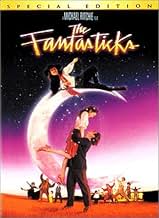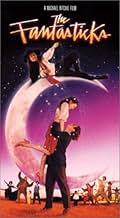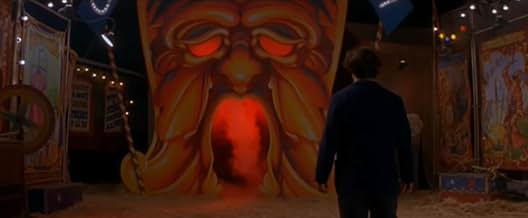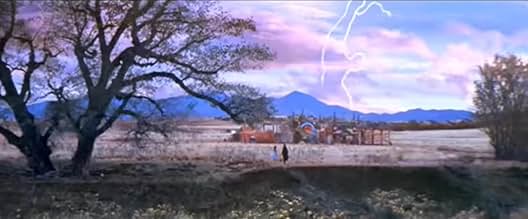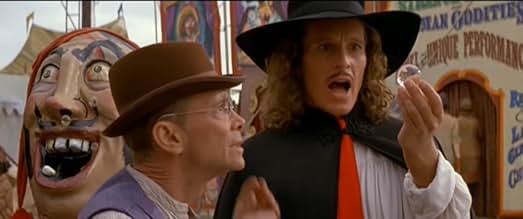AVALIAÇÃO DA IMDb
5,7/10
1,5 mil
SUA AVALIAÇÃO
Adicionar um enredo no seu idiomaA mysterious fair that comes to a small community in the countryside could make real the illusions of two teenagers.A mysterious fair that comes to a small community in the countryside could make real the illusions of two teenagers.A mysterious fair that comes to a small community in the countryside could make real the illusions of two teenagers.
- Direção
- Roteiristas
- Artistas
Joey McIntyre
- Matt
- (as Joe McIntyre)
Tony Cox
- His Assistant
- (as Joe Anthony Cox)
Avaliações em destaque
I think the defining moment of "The Fantasticks" is the presentation of the song, "It Depends on What You Pay." In this film, that title is the only line from the original song that makes it into the film. That's because an alternate title of the original song is "Rape," the word being defined in the musical as "abduction," not the darker meaning. That explanation, curiously, remains in the film, but the other lyrics, describing different kinds of "rapes" are excluded. The exclusion of those lyrics is not surprising--what seemed only risque in 1960 now seems not only politically incorrect but surprisingly callous and insensitive. The fact, however, that one song from a 1960 Off-Broadway musical cannot fit into a 1995 movie, doesn't necessary mean the rest of the musical can.
Much of what was classic in the past no longer fits into contemporary thought. Updating, however, cannot necessarily preserve what made it into a classic in the first place, and it is not just "It Depends on What You Pay" that's been updated.
Speaking of the original "Fantasticks" as a whole, the score is something I fell in love with 34 years ago. The simplicity of it--scored basically for harp and piano--was a revelation compared to overscored Broadway shows. It also accentuated the music's occasional harmonic surprises, which seem to look forward to Stephen Sondheim. More than this, the minimalist staging--no real sets or props--also was very foward-looking, and assisted in making more timeless what might now seem like a very timebound story. I think the fact the original play has run non-stop for 41 years verifies this.
All this is lacking in the film. Jonathan Tunick's updated orchestrations are good, but they blunt the impact of the score. In place of a bare bones stage, we now see location shooting and a huge carnival set. Other songs are abridged, and dialogue omitted. Maybe this had to be done to adapt the musical into something that didn't seem just a filmed stage event and adapt it for modern audiences, but it isn't really "The Fantasticks" anymore, and it shows on the screen. The film comes off hopelessly hokey and contrived. Worse, it comes off as the very thing I believe I remember Luisa asks God not to make her in the play's introduction to "Just Once": ordinary.
Perhaps this is a film that should never have been attempted. And perhaps someone will have the foresight to release the 1960's TV version on video soon.
Much of what was classic in the past no longer fits into contemporary thought. Updating, however, cannot necessarily preserve what made it into a classic in the first place, and it is not just "It Depends on What You Pay" that's been updated.
Speaking of the original "Fantasticks" as a whole, the score is something I fell in love with 34 years ago. The simplicity of it--scored basically for harp and piano--was a revelation compared to overscored Broadway shows. It also accentuated the music's occasional harmonic surprises, which seem to look forward to Stephen Sondheim. More than this, the minimalist staging--no real sets or props--also was very foward-looking, and assisted in making more timeless what might now seem like a very timebound story. I think the fact the original play has run non-stop for 41 years verifies this.
All this is lacking in the film. Jonathan Tunick's updated orchestrations are good, but they blunt the impact of the score. In place of a bare bones stage, we now see location shooting and a huge carnival set. Other songs are abridged, and dialogue omitted. Maybe this had to be done to adapt the musical into something that didn't seem just a filmed stage event and adapt it for modern audiences, but it isn't really "The Fantasticks" anymore, and it shows on the screen. The film comes off hopelessly hokey and contrived. Worse, it comes off as the very thing I believe I remember Luisa asks God not to make her in the play's introduction to "Just Once": ordinary.
Perhaps this is a film that should never have been attempted. And perhaps someone will have the foresight to release the 1960's TV version on video soon.
"The Fantasticks" has been a part of my life since 1960 when I first saw Kenneth Nelson, Rita Gardner, and Jerry Orbach play in the original. Over the past forty years I've directed, played-in, or played-for hundreds of performances from New York to Miami. I feel I know the play inside and out, even adding many touches for the mute that was never off-Broadway. Thirty some-odd years ago, I saw it on television, as I recall, it was John Davison, Lesley Ann Warren, and Ricardo Montalban (as El Gallo). I, being a purist, thought the TV show was abominable. But I was younger and hadn't learned to tolerate or respect other viewpoints or interpretations. I held my breath as I started playing the DVD after finding out that the opening "Try to Remember" was gone....but the more I watched...Jonathan (Stephen Sondheim's musicals) Tunnick's orchestrations started working a magic on me, and by the time "Soon It's Gonna Rain". finished, I was charmed and captivated. I didn't object to the new "Depends on What You Play", for the melody as always been in the score, only played by the "orchestra" as the Rape music ballet. Reading the other posts on IMDB board, I think many comments were unfair to this movie. There is NO way you could capture the original staging on film. A compromise had to be reached. And since it was Jones and Schmidt who wrote the screenplay, they and they alone had to right to do with it as they wished.
I was the focus puller on the film and quite frankly, if you go to most theaters today, you'll see A LOT worse. Let's take it out of the box and hear all of Harvey and Tom's great music and let's relish in the tremendous images of Fred Murphy, ASC.
I am a big musical fan. As a high school choir teacher, I require my students to watch them. I won't be requiring them to watch this.
Another comment on this forum said that the negatively opinionated people should cut the movie version some slack as there are always differences with a screenplay. True, but most of the screenplay versions have become classics in their own right--and for good reason. That reason being that the screenplay itself is an excellent adaptation and it is quality work. Not so with this disappointing movie.
This movie had great potential with a good cast. I think that Jean Louisa Kelly was the bright spot, quite good actually, and the actor who portrayed El Gallo was the low spot.
Ironically, the movie was like the story. Once Matt and Louisa had the freedom to see each other and empowered to make their relationship and fantasies materialize from abstract to concrete, the magic was gone. I felt the magic of the play was gone because much of what was the magic of our imagination and imagery gave way to too many concrete images on screen via sets, props, and what not. It simply didn't work.
I remember the intimacy of doing this play in high school. I was not on stage, but I was one of the "pit" musicians. We did it in 3/4 in the round. The theater seated 70 people. The cast interacted with the pit and the audience. It was simply charming. It was magical. Not so with this movie.
Like others, big question marks entered my head with the script. I kept saying to myself several times during the viewing, "I don't remember this," or "I thought something else happened (or was said)."
No, I'm not going to cut this some slack just because a movie version is going to differ from the staged version. We own most of the movie versions of various musicals and we watch them and re-watch them and re-watch them again and again. Why? Because they're great. This one?....Well, I'm glad we rented it.
Go see the real thing. On a stage.
Another comment on this forum said that the negatively opinionated people should cut the movie version some slack as there are always differences with a screenplay. True, but most of the screenplay versions have become classics in their own right--and for good reason. That reason being that the screenplay itself is an excellent adaptation and it is quality work. Not so with this disappointing movie.
This movie had great potential with a good cast. I think that Jean Louisa Kelly was the bright spot, quite good actually, and the actor who portrayed El Gallo was the low spot.
Ironically, the movie was like the story. Once Matt and Louisa had the freedom to see each other and empowered to make their relationship and fantasies materialize from abstract to concrete, the magic was gone. I felt the magic of the play was gone because much of what was the magic of our imagination and imagery gave way to too many concrete images on screen via sets, props, and what not. It simply didn't work.
I remember the intimacy of doing this play in high school. I was not on stage, but I was one of the "pit" musicians. We did it in 3/4 in the round. The theater seated 70 people. The cast interacted with the pit and the audience. It was simply charming. It was magical. Not so with this movie.
Like others, big question marks entered my head with the script. I kept saying to myself several times during the viewing, "I don't remember this," or "I thought something else happened (or was said)."
No, I'm not going to cut this some slack just because a movie version is going to differ from the staged version. We own most of the movie versions of various musicals and we watch them and re-watch them and re-watch them again and again. Why? Because they're great. This one?....Well, I'm glad we rented it.
Go see the real thing. On a stage.
Ok, maybe it can be argued that it is simply not possible to make a decent film of this wonderful musical. But even given that, one certainly could have done a better job than this. I rate this at the bottom of the pile of stage to screen transfers along with the dreadful Bye, Bye, Birdie and Paint Your Wagon.
First, why cut "Try to Remember" (the one song that practically everyone knows) from the beginning of the picture (and trim it at the end). It establishes the whole mood of the show - calling the audience to remember back when they first fell in love and the magic of that moment. This show just opens with Bellamy sewing (?)
Then, because they wanted to make it more like a traditional movie musical, they cut the narrator - and with him went most of the wonderful dialogue much of it spoken in poetry and verse (note the absence of the speech before "Soon Its Gonna Rain"["You wonder how these things begin...]; trimmed down is the "Curious Paradox" speech the most important part being cut out; gone is Louisa's self-description that sets up "Much More" as well as Matt's intro to "Metaphor"; and most important of all the speech opening the second act is gone which explains much of what the story is about).
Gone also are all the wonderful metaphors (the whole idea behind the song of the same title)that prevade the show - the gardening metaphors are gone (hence why "Plant a Radish" was cut, though one wonders why they left in "This Plum is Too Ripe"); gone also is the metaphor of the wall (one of the most important in the show, leading to the most significant, if not most enigmatic, line in the play "Leave the wall, you must always leave the wall.")
Not surprisingly the mute is cut, but other characters are changed as well. With the narrator gone, the motive of El Gallo is unclear. Why is he doing these things? Why does he say the curious paradox speech if he is not going to explain why he hurt them (and himself)? Only the part of Henry remains fairly faithful to the original play (even Mortimer is given over to Teller as a non-speaking role). Louisa is played too simperingly sweet rather than as a self-absorbed teenage girl fascinated more with the idea of being in love than actually loving Matt. Her transition at the end (from "I am love" originally in Metaphor to "You are love" at the reprise) makes no sense in this version.
Yes, most of the songs are there. But they are often trimmed down, replaced with safer songs (like the absolutely horrible "Abductions" replacing the clever "It Depends on What you Pay) or the lyrics are completely rewritten("Metaphor"). I know the arguments for replacing "Depends", but I have directed the show twice and played El Gallo once and have not ever heard a complaint about the song - you simply have to introduce it correctly.
One wonders why they even decided to film this show if they were going to change it so much. I believe a fairly decent film might have been made if they had stayed with what they had. Instead they decided to go Hollywood with it and the result is nothing like the original story. No wonder it stayed in the can for 6 years before being released. It probably should have stayed there. One big disappointment.
First, why cut "Try to Remember" (the one song that practically everyone knows) from the beginning of the picture (and trim it at the end). It establishes the whole mood of the show - calling the audience to remember back when they first fell in love and the magic of that moment. This show just opens with Bellamy sewing (?)
Then, because they wanted to make it more like a traditional movie musical, they cut the narrator - and with him went most of the wonderful dialogue much of it spoken in poetry and verse (note the absence of the speech before "Soon Its Gonna Rain"["You wonder how these things begin...]; trimmed down is the "Curious Paradox" speech the most important part being cut out; gone is Louisa's self-description that sets up "Much More" as well as Matt's intro to "Metaphor"; and most important of all the speech opening the second act is gone which explains much of what the story is about).
Gone also are all the wonderful metaphors (the whole idea behind the song of the same title)that prevade the show - the gardening metaphors are gone (hence why "Plant a Radish" was cut, though one wonders why they left in "This Plum is Too Ripe"); gone also is the metaphor of the wall (one of the most important in the show, leading to the most significant, if not most enigmatic, line in the play "Leave the wall, you must always leave the wall.")
Not surprisingly the mute is cut, but other characters are changed as well. With the narrator gone, the motive of El Gallo is unclear. Why is he doing these things? Why does he say the curious paradox speech if he is not going to explain why he hurt them (and himself)? Only the part of Henry remains fairly faithful to the original play (even Mortimer is given over to Teller as a non-speaking role). Louisa is played too simperingly sweet rather than as a self-absorbed teenage girl fascinated more with the idea of being in love than actually loving Matt. Her transition at the end (from "I am love" originally in Metaphor to "You are love" at the reprise) makes no sense in this version.
Yes, most of the songs are there. But they are often trimmed down, replaced with safer songs (like the absolutely horrible "Abductions" replacing the clever "It Depends on What you Pay) or the lyrics are completely rewritten("Metaphor"). I know the arguments for replacing "Depends", but I have directed the show twice and played El Gallo once and have not ever heard a complaint about the song - you simply have to introduce it correctly.
One wonders why they even decided to film this show if they were going to change it so much. I believe a fairly decent film might have been made if they had stayed with what they had. Instead they decided to go Hollywood with it and the result is nothing like the original story. No wonder it stayed in the can for 6 years before being released. It probably should have stayed there. One big disappointment.
Você sabia?
- CuriosidadesThe movie was filmed in 1995, and shelved for five years. The released version was re-edited by Francis Ford Coppola with the consent of director Michael Ritchie.
- Versões alternativasThe DVD includes 3 deleted songs
- Plant a Radish, Get a Radish.
- It Depends on What You Pay.
- Try to Remember
- Trilhas sonorasOverture
Music by Harvey Schmidt
Principais escolhas
Faça login para avaliar e ver a lista de recomendações personalizadas
Detalhes
- Data de lançamento
- País de origem
- Idioma
- Também conhecido como
- The Fantasticks
- Locações de filme
- Empresas de produção
- Consulte mais créditos da empresa na IMDbPro
Bilheteria
- Orçamento
- US$ 10.000.000 (estimativa)
- Faturamento bruto nos EUA e Canadá
- US$ 49.666
- Fim de semana de estreia nos EUA e Canadá
- US$ 24.176
- 24 de set. de 2000
- Faturamento bruto mundial
- US$ 49.666
Contribua para esta página
Sugerir uma alteração ou adicionar conteúdo ausente


